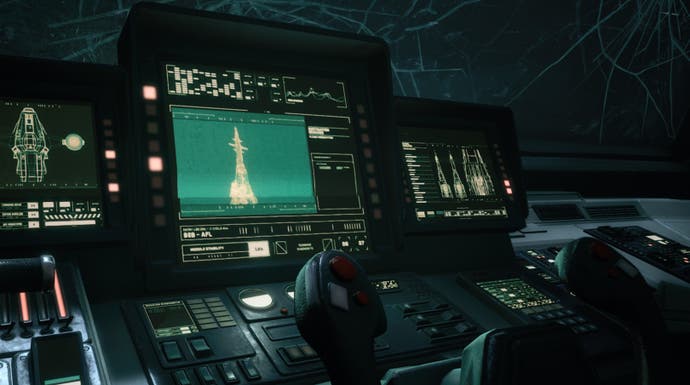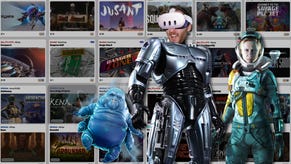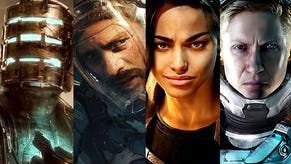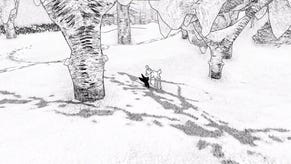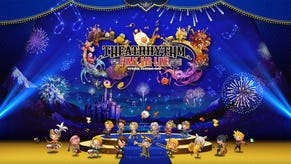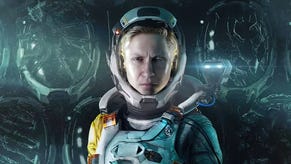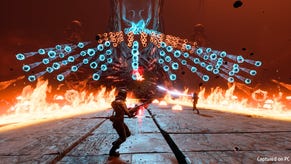How PlayStation 5 exclusive Returnal is keeping the arcade fires alive
Housemarque on the PT influence, justifying the ?70 price tag and the future of the studio.
It doesn't really feel like a PlayStation launch without a Housemarque title, whether that's Super Stardust's fine appearances at the dawn of PS3, Vita and PSVR or Resogun's star turn upon the release of PlayStation 4. For PlayStation 5, we've had to wait a little while, but it's understandable why - with Returnal, Housemarque makes perhaps its biggest departure yet with a shift to blockbuster third-person action.
We've just been afforded a fresh look at Returnal as part of tonight's State of Play, showcasing the procedural levels, the intense atmosphere and gunplay as well as a surprise shift to a PT-inspired first-person interlude. It's a lot to take in, so we spoke through it all with Housemarque's own Mikael Haveri and Returnal director Harry Krueger.
It's great to have Housemarque back. I didn't quite realise it's been four years since your last release, which is quite some time for you guys. And a lot has happened in between. Early last year, I'm sure I wasn't alone in being a little bit concerned for Housemarque - there was the whole arcade is dead thing after Nex Machina underperformed, and then Stormdivers was put on the shelf. And then you come back with what looks like your biggest, most ambitious and grandest game yet. So how did you go from Nex Machina not doing so well to all of a sudden making something on this scale?
Mikael Haveri: Well, it's exactly the way you put it. This is a huge sort of transformation, and a new direction, our biggest game ever. The spirit of arcade is definitely alive, and we're well! So we're not worried about that at all! You know, Harry's vision is pure, it's gameplay centric, it mixes and matches all these things.
Harry Krueger: Absolutely - so as Mikael said, this is by far our biggest and most ambitious title to date. And, of course, we have accumulated quite a bit of experience making these arcade inspired games over the last two console generations, and that creative philosophy definitely lives on now in Returnal - just in a slightly different package this time around.
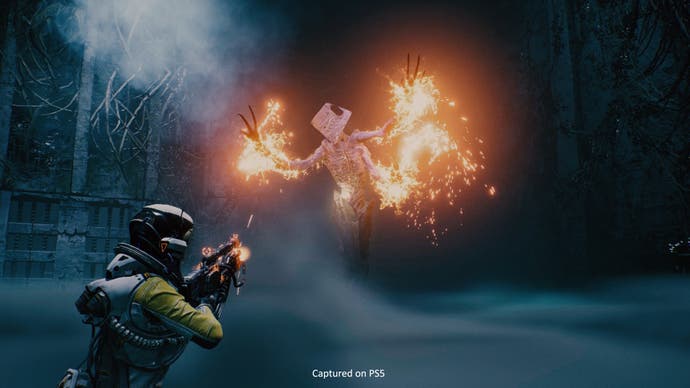
Just to elaborate a bit more on that. In practice, instead of our traditional sides scrolling or top down camera, we have what I'd describe as a third person, bullet hell arcade adventure. And that's enriched with some roguelike elements for variation and replayability. And this time around - since all that clearly wasn't ambitious enough! - we're also diving deep into telling a dark and compelling story as well. So this whole package that I just described is absolutely new to us as a studio, but we feel it's also a fairly unique combination in the third person action game space. It's been a dream project for us in many ways.
I love how much of the arcade stuff is still in there. It looks a lot to me like Nex Machina in 3D, basically, which makes my heart just sing. How did you go about transposing that kind of arcade gameplay into 3D? When you've got a whole new dimension to play with it must change the dynamics completely.
Harry Krueger: Absolutely, yeah. We've had a lot of different influences for Returnal, but in some way our biggest source of inspiration has been our own games, of course, trying to bring that explosive bullet hell layer to a slightly more modernised package in a way. And traditionally, these gameplay elements, they do tend to live in 2D space, where you have better spatial awareness, you can see the bullets coming from all directions. We just committed to taking that to a third person space, and we've been just balancing and tweaking that accordingly along the way.
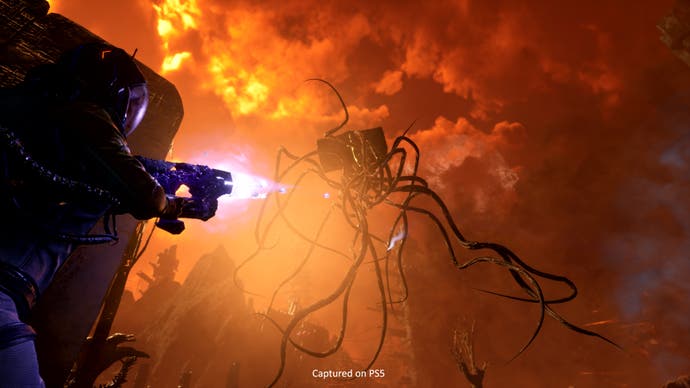
It is a game that is going to put your spatial awareness to the test. We have meticulously crafted a lot of the bullet patterns, a lot of the pacing when it comes to enemies, how they attack you and what kind of synergies they provide as they're combined, and also play a lot with the verticality in the game as well. You do have more escape routes, you do have more traversal options compared to our previous games. That allows you a lot more freedom in how you want to engage with this bullet hell gameplay we're providing. The result is challenging, but it's also incredibly satisfying to be weaving through those bullets in this 3D space.
Mikael Haveri: In addition, I must say that we're adding senses to the plethora - the 3D audio and the haptics, the adaptive triggers, those let you get into the zone even better than before.
I haven't been able to play it myself yet, so tell me a little bit about the haptics, because I love that stuff.
Mikael Haveri: It's so good I'll give you a little pointer - so for example, we have aim down sights with the L2 button, and then you push it all the way down and each weapon can have one of many alternate fire modes, that's the full trigger press. And it's balanced in a way that it feels natural. We try to have things that are more subtle than than too much in your face. Basically the controller is talking to you. For example if your alt fire isn't reloaded yet, you'll feel that it's not available. You don't have to see any of the visual cues. The controller is speaking through your hands. It's quite a good Housemarque experience extension, in my opinion.
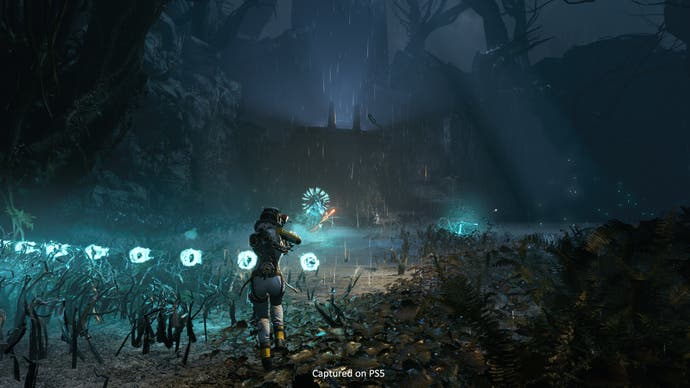
Harry Krueger: It's always exciting to tinker with new tech and experiment with the possibilities as the new hardware rolls in. With the haptics, I think we've all been amazed by the fidelity that you can get this time around, and with the nuances. Housemarque games are traditionally very sensory, they're really audio-visually very over the top, and we feel the haptics complement that package really nicely. The 3D audio also enriches the package, not only in our narrative moments that are a little bit more esoteric and ponderous, but also even in the heat of combat it can help with your spatial awareness, and identifying the origins of different threats or bullets that are coming towards you.
You've gone the procedural route as well, which is really interesting. It's a game with a really strong sense of atmosphere - how'd you maintain that sense of atmosphere while not making it look like it's just cookie cutter elements coming together?
Harry Krueger: So yes, our world is procedurally generated. But the way that we've created it is that we have these individual blocks or individual rooms or levels, and those are carrying the mood and the world building right of the game. And then we just configure and shuffle those around in randomised ways each time that you play the game, so you still get exposed to the same kind of storytelling beats over multiple sessions, but it's just that the timing of when you encounter these will be altered. And this is actually something that is recognised by our narrative as well, so it's not just a gameplay thing. It is actually part of our story that Selene, our central character, is trapped in this time loop. And each time she awakens, the world is different. She's like a rat trapped in an ever changing maze. It has been very important to us to maintain that world building and that mood, and develop the story more across each session that the players engage in.
I love the character of Selene - she looks quite different to what you'd expect as a lead of a triple A title. Can you tell me a bit more about the thinking behind that, and where you're going with that?
Harry Krueger: We're really proud of Selene as a character. When we started off, we knew that we wanted to create a strong and complex human character. Not one dimensional and not a character that falls into the usual recognisable archetypes or tropes. I don't want to say too much about Selene because we want her story to be explored by players, of course, as they dive into Returnal, but she is a multi-layered character. Clearly there is some reason that she has come to this hostile alien planet, there's some history that's going to be really interesting to explore, she's definitely not not a one sided character, she has a deep history that has also developed over multiple lifetimes and deaths on this planet through this predicament she's captured in.
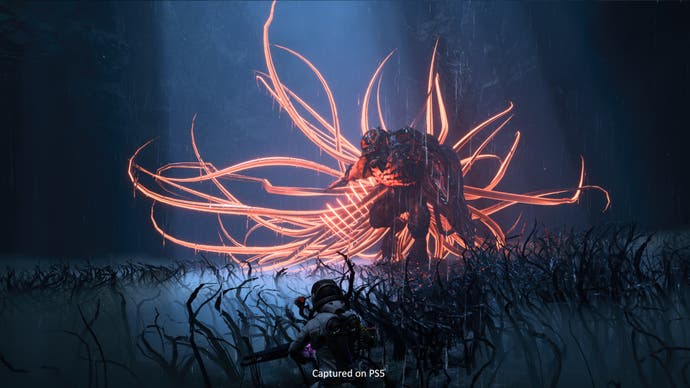
One aspect of that, which kind of took me completely by surprise in what you've just shown was the - well, for want of a better term, the PT bit basically. That was unexpected! I was expecting the Housemarque style, but to have that element was a shock. Can you tell me a bit more about that?
Harry Krueger: Yeah, so that's definitely a great catch. We have had a variety of different influences, of course. And when you look at those segments in the house, that is just another way that we're trying to tell Selene's story. The camera shifts from third person to first person, which is a more intimate way to explore that mysterious past, and it starts blending a little bit more into the psychological themes there. Is she actually experiencing this? Or is the planet just toying with her sanity? We tried to blur the line a little bit there. We feel it's a fairly unconventional way to break away from the explosive arcade action, but it's proven to be a very effective way to connect with the character and tell an engaging story.
With first-person thrown into the mix you're doing a lot of new things with Returnal. What's that meant for the studio? How's it all changed, because I imagine you've had to recruit and expand quite a lot for this.
Mikael Haveri: We've been fortunate enough to expand. We're 80 plus internally, we have a very large team helping us with external help from Sony and affiliates as well. So it's been quite a lucky ride to get into this. We've got everybody in the team focusing on bringing this title to the full quality levels that Housemarque is known for. It's kind of all hands on deck, and lots of new things to learn, but also lots of new chances to innovate.
Is this Housemarque 2.0 basically - actually that should probably be 4.0 or 5.0 as you've been around a while - but is it effectively setting the foundation for what's to come?
Mikael Haveri: We refer to the previous generation, if you will, as our golden era of arcade. And I think that really defines us, as a company, as a culture, what are our core beliefs and strengths. And now we do need to be able to showcase our moxie on the other level.
Harry Krueger: It's a really exciting time in the studio. And as you alluded to earlier, I think there is the end of one chapter in a way, as Mikael said, with the golden era of arcade games. So it's the end of that chapter, and definitely the bold beginning of a new one. And we feel that Returnal will redefine what players expect from Housemarque in this generation to come.
Going back to the very origins of Housemarque, you've got that demoscene heritage as well, and you're used to pushing tech to the max. How is that manifested in Returnal?
Harry Krueger: A lot of Housemarque's history has had its roots in the demoscene, like many other Finnish studios. A lot of that expertise and let's say tenacity for visual flair has made its way into our previous games, and both the tech expertise we accumulated and those sensibilities are manifesting in Returnal well. In practice, we do have our own in house tech, and specifically our VFX system that runs exclusively on the GPU and has allowed us to do some really impressive looking effects with a really minimal footprint on performance. So you'll definitely be seeing a lot of that visual flair in Returnal as well.
One other thing - and sorry to speak in quite crude terms - when people play Housemarque games, they're normally used to paying ten to fifteen pounds. Obviously, PlayStation 5 games like this are a bit more expensive than that. How are you going about addressing that? That's going to be a big, big hurdle to get over I imagine.
Mikael Haveri: Absolutely. In the end, this is our biggest, most ambitious title ever. So we're very much just leaning into players discovering the experience we have for them. And we are pushing the envelope of this next gen experience. So I think that I think a lot of players will see that it's really worth the experience. But then again, we're not here to talk politics. We're here to create the best game we can. So I'll leave it at that.
I'm just going back to the beginning. I know this statement you made four years ago about how the arcade is dead - you must get sick of people like me bringing it up again - but it seems to me that it's very much alive, you're just taking it somewhere else and somewhere really exciting. Do you still stand by that statement?
Mikael Haveri: That's very much our rock and roll statement of saying we've had a run within this specific type of genres and we now need to also look for new venues. We can't be that jazz band, we have to get into the arenas now! There is that end of an era of feeling there, but I think the spirit is much more than alive. It's much more exciting also, to be able to innovate upon it. It's a good step off to something new.
Harry Krueger: I just wanted to echo that sentiment. The arcade spirit very much lives on with Returnal, just in a slightly different package. And from a creative standpoint, of course, when I hear the statement that arcade is dead, the only thing I have to say is long live the arcade!
